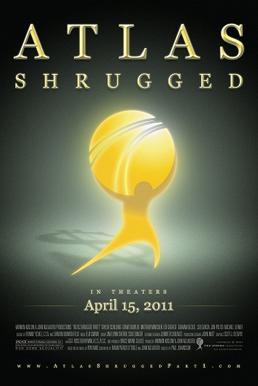I have never read The Fountainhead or Atlas Shrugged, so all of my impressions here will be coming from the film (and to a lesser degree, eavesdropping on the dialog from
BioShock). I went to see this movie on a whim one weekend a few weeks ago. I had not even heard it advertised, but seemed to hold more intrigue than the comedies and whatnot playing at the time. There may be spoilers below, but the film is only based on the first third of the book, so you'll probably be ok.
Every viewer starts off with a
willing suspension of disbelief and the director can either maintain it or squander it or hope that the plot events are too cool/heartwarming for folks to care. For me, there were too many holes and no effort to cover them up. It made me wonder if Ayn Rand or the producers considered those elements to be weak parts of the plot at all or if this was an honest window into their worldview. For example, the story is set in 2016 and one of the main characters (Rearden) is a steel magnate who has produced a new alloy that is practically
Mithril. Cool; I am on board with that sort of foreseeable future type fiction. But in a tough economy, other metal production and fabrication companies want access to the secret formula for this alloy. When Rearden tells them no, they throw their efforts into politically discrediting the material as "unsafe" while dismantling the Rearden consortium that produces it. Ok; business is war and while corporations are rarely so openly Machiavellian, it's plausible. Now the part that's hard for me to stomach is how this "political pressure" affects the scientific community in the film. As a whole, they completely sell out and publish "studies" whose results follow the party line (the audience sees a montage of magazine covers like Nature and Popular Science with expose articles on the unsafe fraud metal). This is not social science application theory or something like pharmaceuticals in which long-term interactions and affects are difficult to predict. This is metalurgy! As clear-cut an engineering discipline as any. While it may have a secret formula for production, there are hundreds of labs at universities around the country that can easily confirm or deny the weight and tensile strength properties that Rearden claims. The producers want me to believe these political interests bought out all of these professors to keep them from publishing the "true" capabilities of the alloy? What about grad students with keys, ambition, and an aversion to both authority and sleep? And how did our other industrial heroine Dagny figure out that Rearden's claims were genuine? It's a throwaway line; "I looked at it myself; I studied engineering in college." The whole plot turns on this concept that our heroes are the only ones who know how good this metal is; the world is out to get them.
Well I felt there were other problems later in the film, but I've rambled for longer than I thought I would already. I may continue later, but for now let me leave you with this quotation that is similar to my experience with the film:
There are two novels that can change a bookish fourteen-year old’s life: The Lord of the Rings and Atlas Shrugged. One is a childish fantasy that often engenders a lifelong obsession with its unbelievable heroes, leading to an emotionally stunted, socially crippled adulthood, unable to deal with the real world. The other, of course, involves orcs. — John Rogers
Breckenridge Oatmeal Stout
Well I didn’t taste any hint of oatmeal. This came off as too bitter for me; too much hops and over-roasted malt for my palate. Didn't strike me as worth the craft price point compared to import classics like Murphy's or Guinness. Just another stout I won't be trying again.













